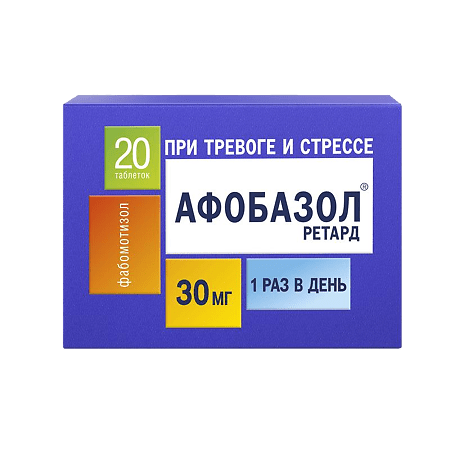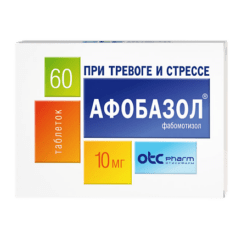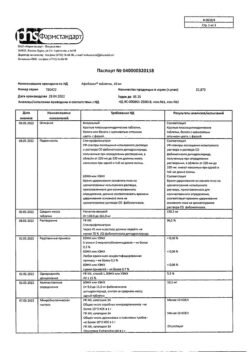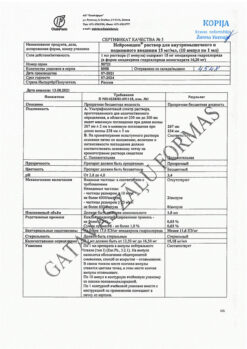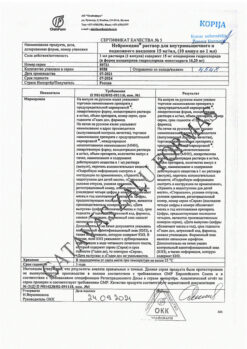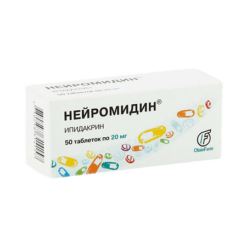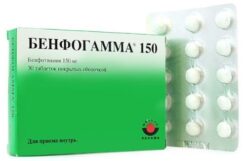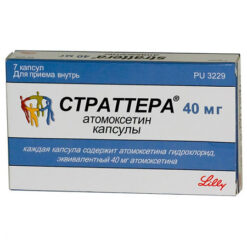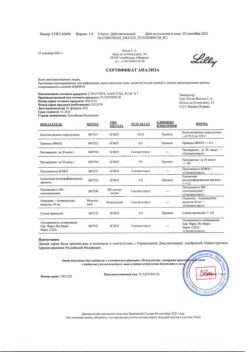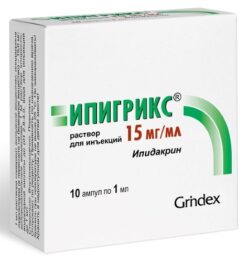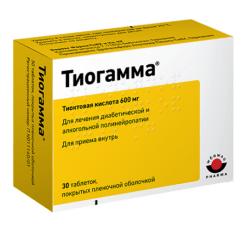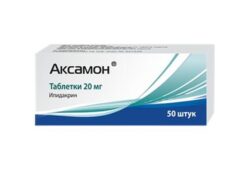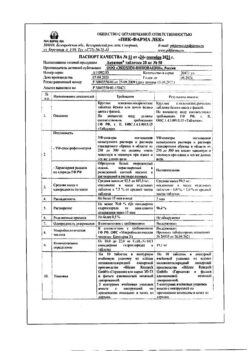No products in the cart.
Aphobazol Retard, 30 mg 20 pcs.
€20.52 €18.43
EAN: 4601669015150
SKU: 510483
Categories: Medicine, Neurology and Psychiatry, Sedatives and hypnotics
Description
Pharmacotherapeutic group: anxiolytic medicine (tranquilizer).
ATX code: N05BX.
PHARMACODINAMICS.
Aphobazol® Retard is a selective non-benzodiazepine anxiolytic.
Acting on sigma-1 receptors in nerve cells in the brain, Aphobazol® Retard stabilizes GABA/ benzodiazepine receptors and restores their sensitivity to endogenous mediators of inhibition. Aphobazol® Retard also increases the bioenergetic potential of neurons and has a neuroprotective effect: it restores and protects nerve cells.
The action of the drug is mainly realized as a combination of anxiolytic (anti-anxiety) and mild stimulant (activation) effects.
Afobazol® Retard decreases or eliminates anxiety (anxiety, misgivings, apprehension), irritability, tension (jitteriness, tearfulness, anxiety, inability to relax, insomnia, fear), depressed mood, somatic anxiety manifestations (muscular, sensory, cardiovascular, respiratory, gastrointestinal symptoms), autonomic disturbances (dry mouth, sweating, dizziness), cognitive disturbances (difficulty concentrating, impaired memory), including those resulting from stressors.including those arising from stress disorders (adaptation disorders). The drug is especially indicated for people with predominantly asthenic personality traits such as anxious mistrustfulness, uncertainty, increased vulnerability and emotional lability, propensity to emotional stress reactions.
Aphobazole® Retard does not cause muscle weakness or drowsiness and has no negative effect on concentration and memory. Its use is not addictive, does not cause drug dependence and does not lead to withdrawal syndrome.
Pharmacokinetics
Aphobazole® Retard is well and quickly absorbed from the gastrointestinal tract after oral administration. Food intake has no effect on the drug absorption and pharmacokinetic parameters.
The maximum concentration of the drug in plasma (Cmax) after a single dose is 47.740+43.252 ng/ml, after multiple dosing – 27.668+13.770 ng/ml; time to reach maximum concentration (Tmax) is 2.1+1.1 and 2.6+1.0 hours after single and multiple dosing, respectively.
Metabolism: Afobazol® Retard undergoes a “first pass effect” through the liver; the main directions of metabolism are hydroxylation by the aromatic ring of the benzimidazole cycle and oxidation by the morpholine fragment.
Aphobazole® Retard is intensively distributed to well vascularized organs and is characterized by rapid transfer from the central pool (blood plasma) to the peripheral pool (highly vascularized organs and tissues).
The elimination half-life of Aphobazol® Retard when administered orally is 8.41+5.01 hours after a single dose and 6.05+3.54 hours after multiple doses. The drug is excreted mainly as metabolites and partially unchanged by the kidneys and through the intestine.
Indications
Indications
Afobazol® Retard is used in adults for anxiety conditions: generalized anxiety disorders, neurasthenia, adaptation disorders, in patients with various somatic diseases (bronchial asthma, irritable bowel syndrome, systemic lupus erythematosus, coronary heart disease, hypertension, arrhythmias), dermatological, oncological and other diseases; in the treatment of sleep disorders associated with anxiety.
Pharmacological effect
Pharmacological effect
Pharmacotherapeutic group: anxiolytic agent (tranquilizer).
ATX code: N05BX.
PHARMACODYNAMICS.
Afobazol® Retard is a selective non-benzodiazepine anxiolytic.
Acting on sigma-1 receptors in nerve cells of the brain, Afobazol® Retard stabilizes GABA/benzodiazepine receptors and restores their sensitivity to endogenous inhibitory mediators. Afobazol® Retard also increases the bioenergetic potential of neurons and has a neuroprotective effect: it restores and protects nerve cells.
The effect of the drug is realized primarily as a combination of anxiolytic (anti-anxiety) and mild stimulating (activating) effects.
Afobazol® Retard reduces or eliminates feelings of anxiety (preoccupation, bad feelings, fears), irritability, tension (fearfulness, tearfulness, anxiety, inability to relax, insomnia, fear), depressive mood, somatic manifestations of anxiety (muscular, sensory, cardiovascular, respiratory, gastrointestinal symptoms), autonomic disorders (dry mouth, sweating, dizziness), cognitive disorders (difficulty concentrating, weakened memory), incl. arising from stress disorders (adaptation disorders). The use of the drug is especially indicated in persons with predominantly asthenic personality traits in the form of anxious suspiciousness, uncertainty, increased vulnerability and emotional lability, and a tendency to emotional stress reactions.
Afobazole® Retard does not cause muscle weakness, drowsiness and does not have a negative effect on concentration and memory. When using it, addiction does not form, drug dependence does not develop, and “withdrawal” syndrome does not develop.
PHARMACOKINETICS.
After oral administration, Afobazol® Retard is well and quickly absorbed from the gastrointestinal tract. Food intake does not affect the absorption of the drug and the pharmacokinetic parameters.
The maximum concentration of the drug in plasma (Cmax) after a single dose is 47.740+43.252 ng/ml, after multiple doses – 27.668+13.770 ng/ml; time to reach maximum concentration (Tmax) – 2.1+1.1 and 2.6+1.0 hours after single and multiple doses, respectively.
Metabolism: Afobazole® Retard undergoes a “first pass effect” through the liver; the main directions of metabolism are hydroxylation at the aromatic ring of the benzimidazole ring and oxidation at the morpholine fragment.
Afobazol® Retard is intensively distributed throughout well-vascularized organs; it is characterized by rapid transfer from the central pool (blood plasma) to the peripheral (highly vascularized organs and tissues).
The half-life of Afobazol® Retard when taken orally is 8.41+5.01 hours after a single dose and 6.05+3.54 hours after multiple doses. The drug is excreted mainly in the form of metabolites and partially unchanged by the kidneys and through the intestines.
Special instructions
Special instructions
INFLUENCE ON THE ABILITY TO DRIVE VEHICLES AND MECHANISMS.
The drug does not have a negative effect on driving vehicles and performing potentially hazardous activities that require increased concentration and speed of psychomotor reactions.
Active ingredient
Active ingredient
Fabomotizol
Composition
Composition
COMPOSITION PER TABLET:
Pregnancy
Pregnancy
The use of Afobazol® Retard is contraindicated during pregnancy.
If it is necessary to use the drug during lactation, breastfeeding should be discontinued.
Before using Afobazol® Retard, if you are pregnant or think you might be pregnant, or are planning a pregnancy, you should consult your doctor.
Contraindications
Contraindications
Hypersensitivity to fabomotizole and/or any excipient in the drug.
Galactose intolerance, lactase deficiency, glucose-galactose malabsorption.
Pregnancy, breastfeeding period.
Children under 18 years of age.
If you have one of the diseases listed above, you should consult your doctor before using the drug.
Side Effects
Side Effects
Undesirable effects that may develop during treatment with Afobazol® Retard are classified according to the following frequency of occurrence:
very common (> 1/10), common (> 1/100 to 1/1,000 to 1/10,000 to < 1/1,000), very rare (< 1/10,000), frequency unknown (cannot be determined from available data).
From the immune system: frequency unknown – allergic reactions.
From the nervous system: rarely – headache, which usually goes away on its own and does not require discontinuation of the drug.
If you experience the side effects listed in the instructions, or they get worse, or you notice any other side effects not listed in the instructions, tell your doctor.
Interaction
Interaction
Afobazol® Retard does not interact with ethanol and does not affect the hypnotic effect of thiopental. Enhances the anticonvulsant effect of carbamazepine. Causes an increase in the anxiolytic effect of diazepam.
If you are using the above or other medications (including over-the-counter medications), consult your doctor before using Afobazol® Retard.
Overdose
Overdose
Symptoms. With significant overdose and intoxication, the development of sedation and increased drowsiness without manifestations of muscle relaxation is possible. Treatment. As an emergency solution, caffeine 20% solution in 1.0 ml ampoules is used 2-3 times a day subcutaneously.
If symptoms of overdose appear, stop taking the drug and consult a doctor immediately.
Storage conditions
Storage conditions
At a temperature not higher than 25 ºС. Keep out of the reach of children.
Shelf life
Shelf life
2 years. Do not use after the expiration date stated on the package.
Manufacturer
Manufacturer
Pharmstandard-Leksredstva, Russia
Additional information
| Shelf life | 2 years. Do not use after the expiration date printed on the package. |
|---|---|
| Conditions of storage | At a temperature not higher than 25 ºC. Keep out of reach of children. |
| Manufacturer | Pharmstandard-Leksredstva, Russia |
| Medication form | sustained release tablets |
| Brand | Pharmstandard-Leksredstva |
Other forms…
Related products
Buy Aphobazol Retard, 30 mg 20 pcs. with delivery to USA, UK, Europe and over 120 other countries.

